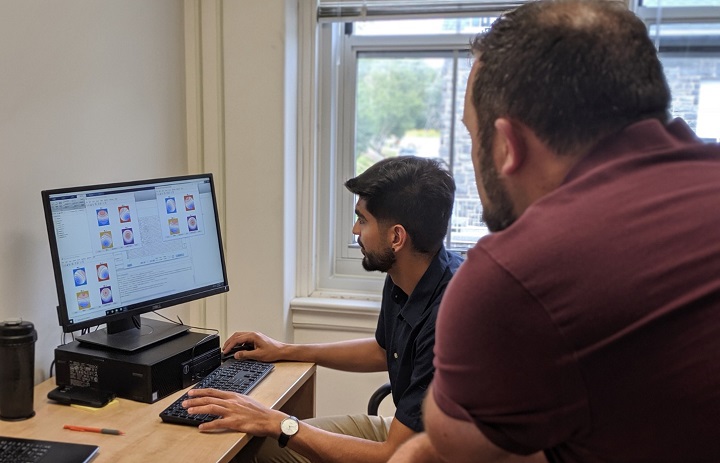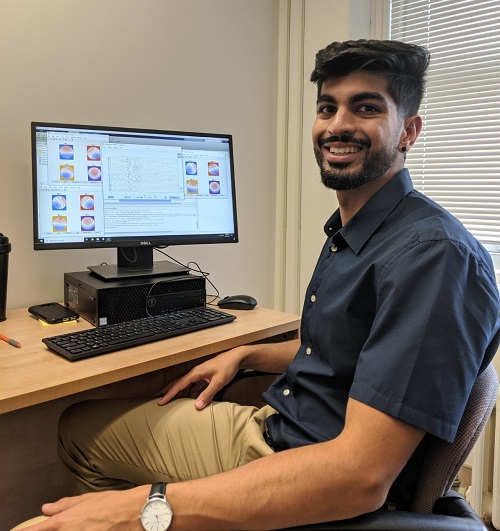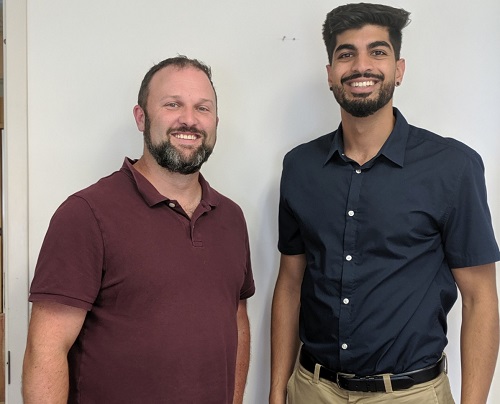
Award-winning MSVU psychology professor and neuroscience researcher Dr. Derek Fisher uses EEGs to study brain activity in psychiatric disorders, primarily psychosis and schizophrenia. His work includes exploring how changes in brain activity after onset of psychosis could be used as a predictor of when psychosis might occur.
Attracted by the opportunity to work alongside Dr. Fisher, University of Ottawa medical student Matthew (Madhav) Arora made the leap to Halifax for the summer. It turned out to be an experience he won’t soon forget.
Meet Matthew (Madhav) Arora
 What brought you to MSVU?
What brought you to MSVU?
“In medical school, there is a lot of pressure to spend your summers wisely. Most people aren’t sure if they want to do research, shadow physicians, or travel and take some time to recharge. I wanted to do it all. About a year ago, I spent a weekend in Halifax and really liked the calm and scenic atmosphere of the city, and decided that one day I’d return. This summer was the perfect opportunity for that.
When Dr. Fisher and I first got in touch to talk about summer research opportunities, he told me about what makes his lab, and MSVU, so special. We have access to incredible resources at our lab site at MSVU and through collaborations with Dalhousie and the QEII; and we also have a close-knit lab team and social environment that comes with being at a smaller school. Dr. Fisher told me that if we worked together for the summer he’d be able to personally teach me the skills I needed to succeed in this research, and that’s what really sold me. At this stage in my career, it’s so important to find mentors who care about my personal and professional development, and Dr. Fisher and his team at MSVU fit that role perfectly.”
When did you begin working with Dr. Derek Fisher and what is your role in his lab?
“Our work began at the start of June 2019. I have been working with Dr. Fisher on bringing some of his newer ideas to life, using raw data he collected during his Master’s degree. He taught me how to process electroencephalography (EEG) data and run statistical analyses. I use the results of these analyses to write-up research papers which we then submit to scientific journals.
 Dr. Fisher really wanted to give me the full learning experience so he also taught me how to run an EEG and obtained ethics approval so I could help my colleagues with their EEG data collection. I’m now leaving the lab just three months later, with a full understanding of their research process, from data collection to publication.
Dr. Fisher really wanted to give me the full learning experience so he also taught me how to run an EEG and obtained ethics approval so I could help my colleagues with their EEG data collection. I’m now leaving the lab just three months later, with a full understanding of their research process, from data collection to publication. I also attend Nova Scotia Early Psychosis Program Research meetings hosted by Dr. Phil Tibbo, a close colleague of ours, where I represent the lab and our research to a team of other researchers and clinicians in the field. Again, this is something Dr. Fisher set up to support my professional growth.”
Why is this work of interest to you?
“I have always had a passion for research. I’ve also always found the brain and the mind incredibly interesting, and in undergrad I was heavily involved in community programs assisting people with brain injuries and mental illnesses. Psychology-based research was the perfect opportunity to combine these passions. I also felt this would be a great opportunity to better understand psychiatry, which I have recently been considering as a future career specialty.”
Is your research role with Dr. Fisher funded by a particular grant/agency?
“We are funded by a summer studentship through the department of Psychiatry at Dalhousie, with Dr. Phil Tibbo acting as a co-supervisor.”
What are your career/academic/research ambitions?
“I’ve realized that my career is always going to be multi-faceted, because that’s the only way to keep me engaged and fulfilled. However, I don’t have many specific career ambitions at the time because I know they will heavily revolve around my medical specialty and where I practice.
Outside of medical practice, I do expect to one day run my own research lab, likely at an academic institution where I can also spend some time teaching. I plan to include a significant community outreach component, likely through public health initiatives. I expect that these endeavours will eventually give way to admin work at a university or hospital, where I’ll be able to make significant widespread change in my community. Lastly, at some point in my life I would like to write a book. Throughout my entire life I’ve enjoyed reading books, and they have had a huge impact on who I am today, and I would like to pay it forward.”
Will you continue working with Dr. Fisher when you return to your home University this fall?
“Yes! Dr. Fisher and I were initially hesitant for me to take on some more work when I return to Ottawa in the fall, because of the heavy work-load of medical school. However, I gave it some thought and realized that balancing research and medicine is going to be a core component of my career, and so I should strive to implement that as soon as possible. Working with Dr. Fisher is the perfect way to begin this career transition because he’s very understanding and flexible – he will help make this transition as smooth as possible.”